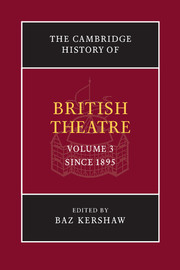Book contents
- Frontmatter
- Part I 1895–1946
- 1 British theatre, 1895–1946: art, entertainment, audiences – an introduction
- 2 The London stage, 1895–1918
- 3 Provincial stages, 1900–1934: touring and early repertory theatre
- 4 Popular theatre, 1895–1940
- 5 Case study: Cicely Hamilton’s Diana of Dobson’s, 1908
- 6 A critical year in perspective: 1926
- 7 The London stage, 1918–1945
- 8 Social commitment and aesthetic experiment, 1895–1946
- Part II Scottish and Welsh Theatres, 1895–2002
- Part III 1940–2002
- Bibliography
- Index
- References
7 - The London stage, 1918–1945
from Part I - 1895–1946
Published online by Cambridge University Press: 28 March 2008
- Frontmatter
- Part I 1895–1946
- 1 British theatre, 1895–1946: art, entertainment, audiences – an introduction
- 2 The London stage, 1895–1918
- 3 Provincial stages, 1900–1934: touring and early repertory theatre
- 4 Popular theatre, 1895–1940
- 5 Case study: Cicely Hamilton’s Diana of Dobson’s, 1908
- 6 A critical year in perspective: 1926
- 7 The London stage, 1918–1945
- 8 Social commitment and aesthetic experiment, 1895–1946
- Part II Scottish and Welsh Theatres, 1895–2002
- Part III 1940–2002
- Bibliography
- Index
- References
Summary
The London stage of 1918–45 has often been characterised as pandering to an undiscerning audience, waiting with baited breath to be entertained by the latest frivolous or escapist offerings of the day – but this is an overly simplistic reading. To begin with, it condones an assumption that our contemporary interpretations of theatre in the period are that much more sophisticated and somehow nearer the ‘truth’ than those of people who were actually a part of it. Moreover, underlying such readings is a failure to understand the complexities of an interwar society that was transformed by enormous social and cultural upheavals over a very short period of time. This chapter reflects upon key issues raised in an analysis of the London stage between the two world wars, in three sections. Firstly, it investigates historiographical approaches to the history of theatre during the era, looking at the nature and social significance of drama for its audiences. Secondly, it examines the growth of theatre as an industry, owned and managed by a new class of entrepreneur, in the light of arguments about a new commercialism versus a belief in theatre for arts’ sake. Thirdly, it proceeds to give an outline of popular themes and genres in playwriting and performance, including an examination of audiences, and closes by looking at government and state intervention in the making of theatre during the period.
British people experienced endemic social paradoxes during the interwar years, with the country plunged into hardship at the same time as benefiting from technological and social development. The nation was in a state of shock after the massacres of World War One, victory soured by the fact that a whole generation of young men had been killed.
- Type
- Chapter
- Information
- The Cambridge History of British Theatre , pp. 143 - 166Publisher: Cambridge University PressPrint publication year: 2004



